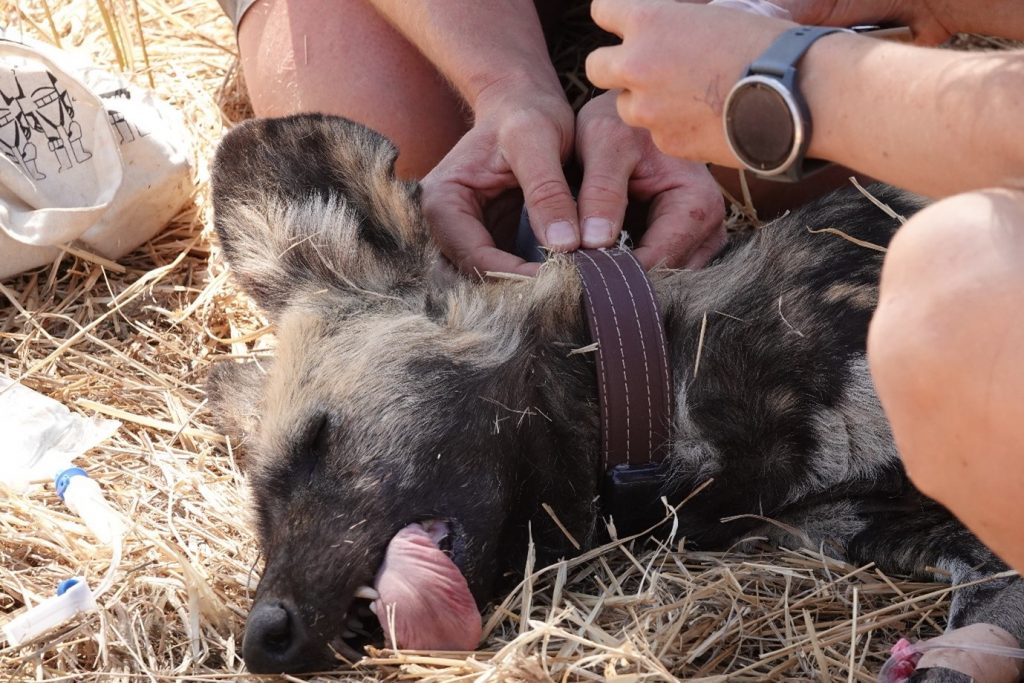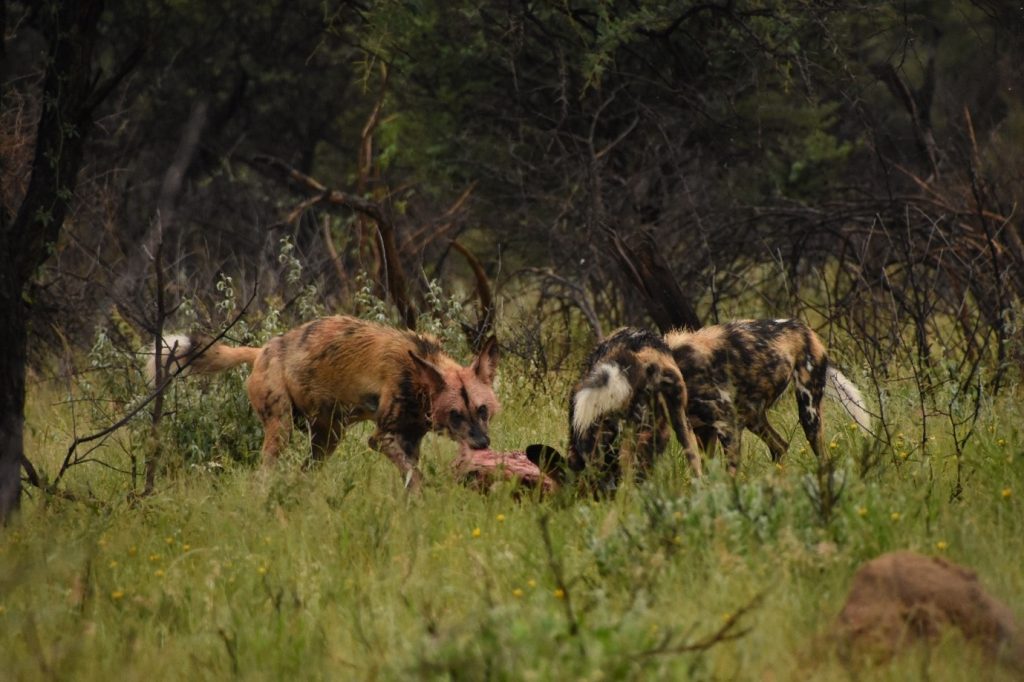
Reintroduction and release of animals is one of the goals towards conservation success. To be part of the story and to follow the ‘Shakespeare pack’ of African wild dogs (Lycaon pictus) from initial bonding in 2019 through to reintroduction and release into a 33,000-hectare private reserve in Namibia in 2021 was a dream come true. Through my PhD research ‘investigating the importance of pack structure to the conservation management of African wild dogs (Lycaon pictus)’ the data will provide a valuable contribution to the conservation of this species.
My PhD journey to this point was as difficult and as turbulent a journey as that of Shakespeare pack. I initially wrote my PhD proposal back in 2016 and constructed my team of supervisors. I finally started my PhD in September 2018. However, finding funding proved elusive. The determination to pursue a career in research which had always interested and eluded me won and I decided to self-fund my PhD, as this was not a dream I was prepared to give up! Hence, I was a very grateful recipient of the Research Support Award from the Graduate School at Manchester Met to help towards my field work costs in Africa.
Then came COVID-19!
As for the Shakespeare pack, the females, Sahara and Atacama, were rescued after a call regarding human-wildlife conflict. The two males, Namib and Veldt, had been tied up with chains as puppies for farmers to shoot the adults when they returned to the den. They were then rescued by the N/a’ an ku se Wildlife Sanctuary. Namib and Veldt were initially bonded along with another two males and one female and were initially released onto the Zannier reserve, Namibia in 2018. Just months later, in 2019, three of the pack were shot and killed and this prosecution case with the alleged offenders is still pending! Namib and Veldt were immobilised and brought back into the sanctuary and placed in an adjacent enclosure to Sahara and Atacama. Love at first site ensued (hence the pack name ‘Shakespeare’) and they were re-bonded as a new pack and prepared for release. However, first a new reserve needed to located and the COVID-19 pandemic hampered the release efforts. Life was also not to go smoothly for Shakespeare as Veldt died after being bitten by a black mamba in the enclosure prior to release in July 2021. However, the decision was made to continue to give this pack a second chance of a life roaming free, and an opportunity to breed, vital as the species is critically endangered in Namibia. During this time, a new private reserve was in the making, the 33,000-hectare TimBila nature reserve. As the reintroduction and release of a pack of African wild dogs is such as rare event, I made plans to take a one-year sabbatical from work and to stay in Namibia for six months to collect this valuable data towards my research. I flew out mid-September 2021 and on the 25th November 2021, the immobilisation process began.

Photo by Helen Reynolds
Unfortunately, this did not go as smoothly as planned as Namib the alpha male and the only individual that had had prior experience of hunting and predator detection from his first release, suffered an anaphylactic reaction to the drugs and both his heart and breathing stopped. CPR and drug reversal were immediately administered prior to immobilisation of the others and despite the odds of just 1% success, he survived! New drugs were administered, and the pack were then flown to TimBila to their acclimatisation camp.

Photo by Helen Reynolds
On the 28th November 2021 they were then fully released into the reserve and extensively monitored. In the first week we witnessed their first hunt of a baby Impala (Aepyceros melampus) as well as locating a kill site of an adult female impala, where they had used an internal fence to assist their success. Shakespeare’s dramas were not yet over however, as on 27th February 2022, Atacama was found with an open fracture of her right front leg from an unknown cause. After veterinary treatment the decision was made that if we could keep infection out, she should heal well, and she would be better running free than bringing the whole pack back into captivity or separating her. The research team managed to successfully give her 14 days of antibiotics in a small chunk of meat and within 7 days the pack had successfully hunted again, despite her injury. She continues to heal well 8 weeks on, and the pack continue to hunt on average, every three days.

Photo by Helen Reynolds
The main threat to African wild dogs continues to be lions (Panthera leo), nine of which had already been released onto this reserve from human-wildlife conflict. So far, the wild dogs appear to recognise predators and move out of an area when lions pass through. May Shakespeare pack’s nine lives continue, and they continue to go from strength to strength!
Perseverance, hard work, dedication, passion is all now starting to pay off for me too. Halfway through my part-time PhD, I am even more passionate about this species, and my research. People believe in me so despite my own doubts and continually suffering from ‘imposter syndrome’, I am starting to believe in myself and gain a little confidence by not comparing myself to others. The Namibian government had approved a further six months to my research work permit till mid-September 2022. In addition, I have attracted several private sponsors who combined will cover my remaining field costs both this year and my final field work in 2023. This has also encouraged me to resign from my job and concentrate on my PhD fully.
Life is full of ups and downs. The lows mean that you really appreciate the highs and I feel so privileged to be able to undertake both this research journey but also to have a glimpse into the lives with just as turbulent highs, lows, and spirit of the Shakespeare pack’s journey back into the wild.
Helen received a Research Support Award to help fund her field work in Africa. To find out more about Research Support Awards, visit the Funding section in Moodle.


